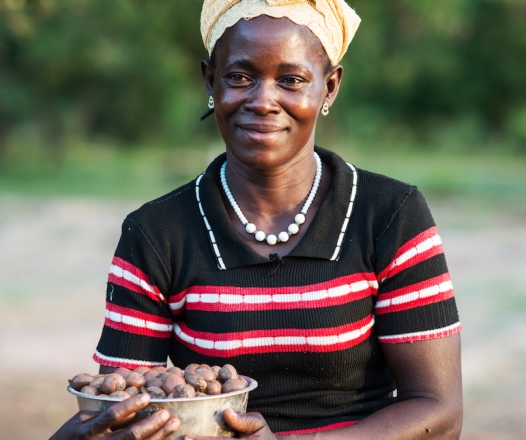AAK has extended its Kolo Nafaso shea sourcing program to support the growing demand for ethically produced chocolate confectionery. The program already reaches 320,000 women in West Africa, representing 8 percent of the global shea industry’s workforce.
Ethical claims are the fastest-growing types of claims in the chocolate confectionery and chocolate spreads sectors, according to Mintel GNPD (Global New Products Database), having increased by about 70 percent between 2016 and 2020.
AAK is one of the world’s leading shea suppliers. The company directly sources shea kernels from Burkina Faso, Ghana and Ivory Coast where women predominantly collect the kernels. Within Kolo Nafaso, established in 2009, AAK purchases directly from women’s groups, ranging from 7 to 400 in size, eliminating the need for middlemen. As a result, the women are empowered to invest back into their own communities. This enables them to build a better livelihood for themselves and their families.
As in many other places, human and labour rights can be major challenges in West Africa, in particular gender inequality. So, there is a need to support these women, many of whom live in rural villages with poverty as an ever-present threat. AAK provides support on a grand scale by having a direct relationship, avoiding the need for intermediaries, and maximising traceability and transparency – resulting in claims that can be carried through to finished products.
Kolo Nafaso achieves its aims to a significant degree. As a result, the program gives the women’s groups a route to, among others, the high-volume mainstream chocolate confectionery sector.
Commented Luis Parra, Global Business Director Chocolate & Confectionery Fats: “To the best of our knowledge, no other commercial program empowers women on the scale of Kolo Nafaso. Our vision is to continuously improve our collaboration and expand its impact in West Africa. We also hope that our model for sustainable sourcing can be inspirational to many other companies.”
Verification landmark
AAK’s Kolo Nafaso programs in Burkina Faso and Ghana achieved a major landmark in 2020, as they were fully verified by Proforest, an external, non-profit organisation that promotes responsible production and sourcing of agricultural commodities. In 2021, the full scope of Kolo Nafaso has been verified, including Ivory Coast.
Women participating in Kolo Nafaso have access to a pre-financing scheme that ensures a stable income during the leanest period of the year, avoiding a large drop in income when shea is out of season. They can opt to receive interest-free credits during lean periods, helping them to maintain their living standards throughout the year and not just during the shea kernel harvest. Members of the program also benefit, directly or indirectly, in several other ways, including:
- A fully ethical and transparent business relationship
- Training in better processing and business practices
- Tree-planting support and access to clean water
- A segregated and traceable supply chain
- A fully audited and verified sourcing program
Kolo Nafaso is aligned with AAK’s corporate purpose, Making Better Happen. It operates alongside a number of other sustainable shea initiatives taken together with industry partners. For example, AAK recently announced a partnership with global confectionery, food and pet care company Mars, several leading NGOs, and an impact investment fund to establish the ten-year Women in Shea (WISH) initiative.
Says Victoria Mars, Chairman of the Board, Mars Incorporated: “We hold firm to the belief that our brands’ success must be aligned with the success of the partners and communities we operate with. We are proud to launch together a large-scale shea sourcing initiative in Ghana to bring benefits to women who live in a particularly fragile ecosystem.”
AAK has also formed a sustainable shea partnership with Scandinavian/Northern European confectionery company Cloetta.
Said Maria Selling, Sustainability Manager, Cloetta: “The partnership between AAK and Cloetta on responsibly sourced shea is an example of how we can work together to create a long-term positive impact in the shea supply chain. With an improved income, the women are also in a better situation to address poverty, which is so often the root cause of many sustainability problems.” For more visit aak.com



